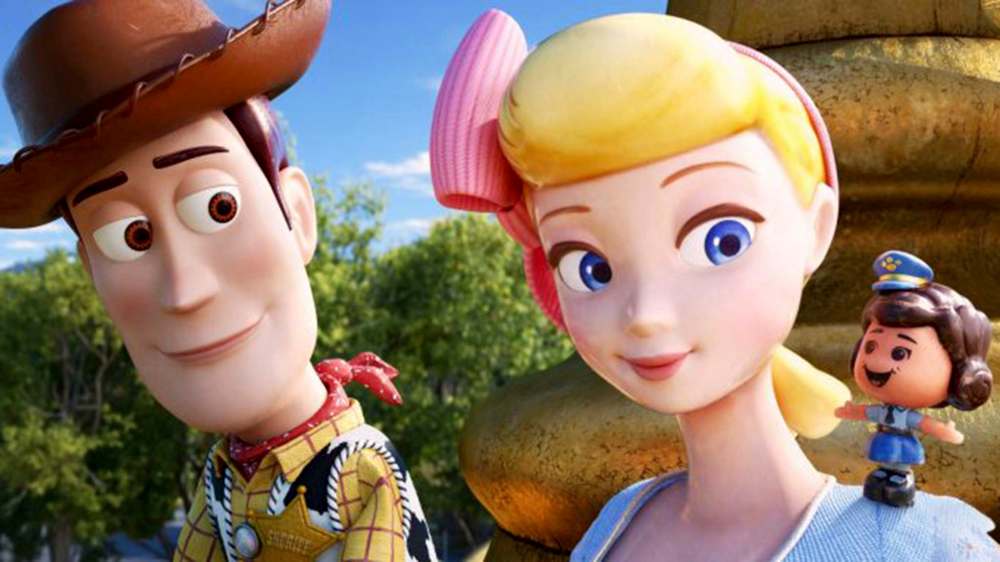Woody and friends reach out of the toy box, go for the heartstrings
New characters keep latest instalment of franchise fun and fresh while dabbling in existentialism
Advertisement
Read this article for free:
or
Already have an account? Log in here »
To continue reading, please subscribe:
Monthly Digital Subscription
$0 for the first 4 weeks*
- Enjoy unlimited reading on winnipegfreepress.com
- Read the E-Edition, our digital replica newspaper
- Access News Break, our award-winning app
- Play interactive puzzles
*No charge for 4 weeks then price increases to the regular rate of $19.00 plus GST every four weeks. Offer available to new and qualified returning subscribers only. Cancel any time.
Monthly Digital Subscription
$4.75/week*
- Enjoy unlimited reading on winnipegfreepress.com
- Read the E-Edition, our digital replica newspaper
- Access News Break, our award-winning app
- Play interactive puzzles
*Billed as $19 plus GST every four weeks. Cancel any time.
To continue reading, please subscribe:
Add Free Press access to your Brandon Sun subscription for only an additional
$1 for the first 4 weeks*
*Your next subscription payment will increase by $1.00 and you will be charged $16.99 plus GST for four weeks. After four weeks, your payment will increase to $23.99 plus GST every four weeks.
Read unlimited articles for free today:
or
Already have an account? Log in here »
Hey there, time traveller!
This article was published 22/06/2019 (2366 days ago), so information in it may no longer be current.
The flagship of Pixar Studios, the original Toy Story was always impressive in the way it operated on two levels of storytelling. First and foremost, it worked as great children’s entertainment, with a story about how all toys are secretly sentient, a reality that stirs up all manner of action and intrigue when they succumb to very human feelings: devotion, jealousy and suspicion.
On a more sophisticated level, the movie took on a serious existential question: what is the meaning of life?
The sequels managed to sustain the high quality of the first film, focusing mainly on Woody (Tom Hanks), the cowboy doll whose initial resentment of shiny space ranger Buzz Lightyear (Tim Allen) yields to a true, enduring friendship.

The fourth film in the series kicks off addressing a hitherto-unanswered question: whatever happened to Bo Peep (Annie Potts), the flirty shepherdess/lamp fixture who literally carried a 60-watt torch for Woody? Missing in action in Toy Story 3, her fate is revealed in an opening-scene flashback before we catch up to Woody, Buzz and the gang fretting about who is going to enjoy playtime with their new kid, Bonnie.
It turns out that, for all his devotion, Woody finds himself in the population of toys that are kept in the closet during playtime. Woody finds a new purpose, however, when Bonnie brings home a “toy” she herself created at her first day of kindergarten.
Forky (voiced hilariously by Tony Hale of Veep) is a spork with mismatched googly eyes, popsicle-stick feet and a pipe cleaner for arms. He gains a consciousness in the bargain and is suddenly asking questions, mainly: why am I alive? (You and me both, Forky.)
Given his disposable nature, Forky recklessly tries to deposit himself in the trash at every opportunity. It falls on Buzz to retrieve him and urge the new toy to rise to the responsibility of being Bonnie’s new favourite plaything.
When Forky jumps out of the family RV during a road trip, Woody follows, resolving to meet back with the gang at the trailer park destination. Along the way, however, he sees Bo Peep’s lamp burning in a second-hand shop, but his hoped-for reunion is interrupted by an unloved talking doll named Gabby Gabby (Christina Hendricks), whose show of hospitality hides a more sinister purpose. Woody has something Gabby wants.
The second-hand shop and a neighbouring travelling carnival offer up an assembly of hilarious new characters, including Canadian action figure Duke Caboom (Keanu Reeves), traumatized by the rejection of his sole kid owner, Rejean.
At the carnival, Buzz is compelled to join forces with a couple of streetwise yet delusional plushies, Ducky (Keegan-Michael Key) and Bunny (Jordan Peele), to escape being displayed forever at a grungy shooting-game kiosk.
A quartet of ventriloquist’s dummies are, of course, terrifying.
But Woody’s personal crisis is again at the core, and here in the real world, it might have a particular resonance, especially for those grandparents who may be taking their grandkids to the movie. Woody’s issue is one of post-parenting. When is it time to let go of the kids?
It’s a point made subtly by director Josh Cooley, making his feature debut. The foreground is very much dominated by the usual Toy Story tropes, as playthings plan and carry out invasions and escapes in the usual spirit of high invention. (Toy Story movies are basically Mission: Impossible told in the medium of Mattel.)
But the subtext is unexpected and tender-hearted, without dialing it up to the emotional juggernaut that was the finale of Toy Story 3. It suggests life after child care isn’t necessarily a slow slog to inevitable expiration.
Here, Woody’s situation invites a more gentle description. Perhaps: falling… with style.
randall.king@freepress.mb.ca
Twitter: @FreepKing

In a way, Randall King was born into the entertainment beat.
Our newsroom depends on a growing audience of readers to power our journalism. If you are not a paid reader, please consider becoming a subscriber.
Our newsroom depends on its audience of readers to power our journalism. Thank you for your support.


